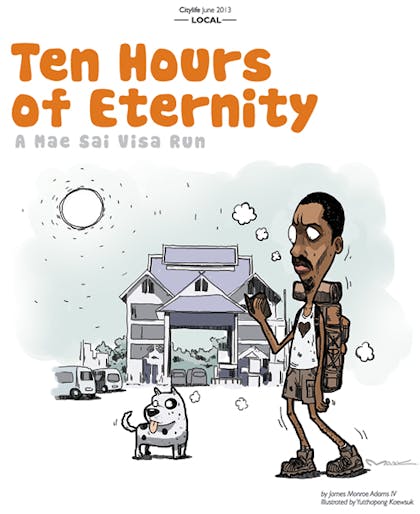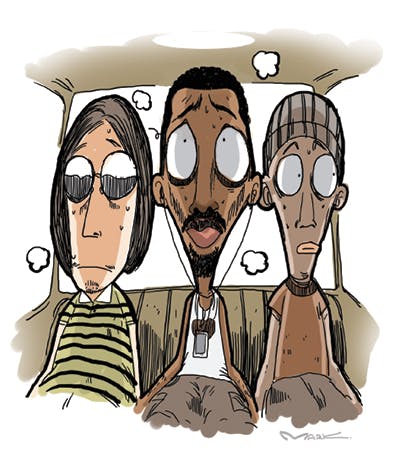
My morning begins with a brisk walk to Wat Ched Yod. Most people have no idea how to get to my house, and I have no idea how to give directions in Thai, so Wat Ched Yod is a pleasant compromise. The sun hangs slack in the sky as if just waking, casting golden light on a monk seated on a guardrail. About one hundred yards past him stands King Tilokarat’s Madha Chedi, the stucco statues stare forever into the beyond as another monk takes a moment to sweep leaves from a footpath leading to the car park in front of the gravel road where the minibus sits. They are 45 minutes late and the driver could not be bothered to drive another half minute into the lot to pick me up. I manoeuvre to the rear of this air-conditioned coffin on wheels that would likely come apart in a minor collision but can get me to the border and back in 10 hours for only 550 baht.
The Necessities
Items needed to make a visa run tolerable, in order of importance:
1. MP3 player
2. Water
3. Book (this would be first, however it can be difficult to focus on script during a fast drive down a narrow, serpentine road)
4. Ability to sleep while seated
5. Ability to keep calm as oncoming traffic rushes toward you
The Lunch Break
After two hours we pull over for a 15 minute break at the Chiang Rai hot springs. At the entrance of the rest area resides a geyser that spews a mist that smells of soggy diapers. Tourists huddle around the water columns taking photos of loved ones getting moist. On either side of the geysers sit various restaurants, jewel shops and curio kiosks, eager to sell nothing of great need.
I have been in-country long enough to know how to order food in Thai. I have not been here long enough to know what the average Thai considers to be an odd combination of food. I drag myself to a food counter and order pad se eew khai dao. I love this dish and eat it nearly every day, a mound of kale, flat noodles and pork chunks topped with an over-medium fried egg and dusted with chilli pepper. I state my order in toddler Thai and the server repeats the order twice, giggling and shaking her head with disbelief. I smile and affirm my request. Ten minutes later and my food is served. The four customers flanking me look at my dish and laugh, as if I am about to consume a joke with a cheeky punchline.

The Travel Buddies
With food in my stomach I return to the minibus and we pile in and prepare. We dig in for the long haul. A conversation of sorts starts with the Russian man sitting to my right. We talk about home, about women and about music. He expresses his love of Technotronic and admonishes me for not knowing the song ‘No Coke,’ rapped in 1990 by Dr. Alban, a Nigerian-Swede who was huge in Europe but unheard of in the States. “You must be in your 20s and not know much about the music of the 90s,” the Russian tells me. I insist that I am 33 and avant-garde. His face is a slavic square of disbelief.
The conversation dissolves in the recycled air like clumps of detergent in agitated water. I alternate my attention between my iPod Touch, staring blankly at the backs of heads in front of me and trying to sleep through the mild discomfort. The outside world of rice fields, wat and oncoming traffic whiz by as I try not to sing aloud to The Wu Tang Clan or Otis Redding or Mötley Crüe. This is my 15th, maybe 20th visa run, a run to Mae Sai that is necessity for we farang without state sanctioned employment, we disheveled few with enough to get by but not enough to go to Vientiane. We wearers of flip flops who met a special someone and want to stay a few more weeks (which morphs into another year or ten), we inhabitants of legal limbo too alien to be comfortable but too comfortable to leave.
The Arrival
About three hours later we reach our destination. We stretch our legs and prepare to walk the gauntlet. We wait as we hear our peers admonished by a certain female immigration official for making too many trips to Mae Sai. I bow my head, a silly attempt to elude her gaze. For I too am guilty of this transgression and am too aware that I need to let the man behind me go ahead as to avoid her scrutiny. The sun beating down on our backs as the PA system chirps greetings, instructions and well wishes through the 35 degree heat. The leaden fumes from the vehicles to my right, their engines idle as officials search for yaba and human chattel within the tuk tuks, minibuses and pickup trucks. The awkward greeting, the strained smile, the waiting, being photographed, slight anxiety, the stamp then over the bridge and border, remembering that the Burmese drive on the right.
The officials in Tackhilek wear white uniforms and smile with warmth, or stay stoic as they enter your information into a database that already contains your information. Five hundred baht later and I am in Burma. I buy a beer and chat with Slim, a Burmese guide who works the foreigners looking to spend more than an hour in his country. Pleasantries are exchanged as around us tuk tuk drivers offer tours of temples and access to the best brothels. Foreigners shop for cartons of Marlboros, packets of Viagra and knock-off Ray Bans. I ask Slim about his kids, and he asks me why I don’t have any. “If I had kids I would not be here, talking to you,” I tell him. A bleak blessing and a welcome curse.
The Return
I walk back into Thailand, get permission to stay in the country for another two weeks, return to the mobile coffin and say silent prayers to a God I don’t believe in. “Please let that M150 keep the driver alert enough to keep us on the road. Please let the hippy seated in front of me keep his dreads to himself. Please let no one notice that I am not wearing underwear,” I whisper as we rocket off into the grey dusk, past the tourist traps and army checkpoints that border this asphalt river running through northern Thailand.
The minibus drops me off. I say goodbye to my temporary friends, knowing that in a fortnight the process will reoccur and repeat, until I break down and become a normal person.
